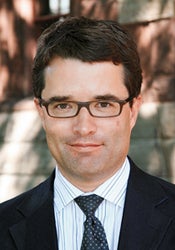Is the International Criminal Court succeeding? According to Assistant Clinical Professor Alex Whiting, the answer is a tentative yes. Nevertheless, Whiting—who serves as the prosecution coordinator in the Office of the Prosecutor at the ICC—provided a candid portrait of the court’s strengths and weaknesses at a talk on Wednesday, Oct. 10, sponsored by the Harvard Law School Human Rights Program.
Ever since Luis Moreno-Ocampo stepped down as chief prosecutor of the ICC and was succeeded by Fatima Bensouda last December, Whiting said, his office has been thinking a great deal about what it means for the court to succeed.
“We’re trying to figure out what the question means, rather than trying to figure out the answer,” Whiting said. Still, he argued that success can be broken down into three evaluative categories: how it functions, its impact and its ability to deter future violence.
In terms of functionality, Whiting said the ICC is doing well. The court has been operational for ten years, has 121 state parties and is conducting ongoing investigations in seven countries: the Democratic Republic of the Congo, Sudan, Uganda, Libya, Kenya, Central African Republic and the Ivory Coast. A case may open in Mali soon, Whiting said, and the court is considering an investigation in Georgia, Afghanistan and Colombia. Twenty-nine people have been publicly charged by the ICC, 15 of whom have appeared before the court while 14 remain fugitives. Whiting said the number of fugitives is a source of concern for his office, as they are not likely to be apprehended. In response to this problem, he said, ICC prosecutors will likely have to spend more time investigating and bring in fewer cases.
Despite the court’s operational success though, Whiting acknowledged that it suffers from a “legitimacy drag.” The ICC has been plagued by accusations that it unfairly targets individuals in weak countries and lets more powerful countries escape accountability, Whiting said. (The United States and Russia, for example, have not acceded to the court’s jurisdiction.) It has also been criticized for opening cases only in African countries. In response, the ICC has considered moving some of its operations to Africa, but has not done so due to security and budget constraints.
Nevertheless, Whiting pointed out, the case in Kenya is the only investigation the ICC pursued on its own initiative. Most of the court’s cases are self-referred, including those of Uganda, the Central African Republic, Mali and the Democratic Republic of the Congo. Libya and the Sudan were referred to the ICC by the United Nations Security Council.
In general, the court’s investigations can be complicated by non-legal considerations, Whiting added, because the ICC derives jurisdiction not just from a state’s accession to the court’s founding treaty, but also from the Security Council. In February 2011, for example, the Security Council referred the case of Libya to the court, but not the case of Syria.
“The problem is that the perception is that these decisions are made for political reasons, economic reasons, and not made for reasons of justice,” Whiting said.
It can also be problematic, Whiting admitted, when countries refer their own cases to the ICC and the court proceeds to investigate the rebels and not the government in power. Although over time the court hopes to address that problem, Whiting said, he conceded that investigating a government from the beginning could hinder cooperation.
Despite some of these political shortcomings, Whiting said the court has concretely affected the outcome of a political conflict. He examined the court’s impact through the lens of the Libyan political conflict, in which the ICC played a key role, he argued. Soon after the violence began in February 2011, the Security Council referred the Libyan case to the ICC and NATO began an intervention in March. The court issued arrest warrants at the end of June. In July the NATO operation stalled and some countries began to consider negotiation. But under the treaty, the ICC’s member countries are required to enforce the court’s warrants, and so the media and the international community pushed back. As a result, Whiting said, negotiation did not take place and the individuals charged by the ICC were eventually captured by Libyan rebels. Negotiating a settlement, Whiting said in retrospect, would have been a disaster.
The court’s ability to deter future criminal conduct, though, is difficult to determine because there are so many interrelated factors, Whiting said. No domestic system has succeeded in completely deterring criminal conduct, and he cautioned that international criminal justice should not be held to a higher standard than domestic criminal justice.
The ICC will probably not be able to deter the next violent dictator. But Whiting believes the court can at least constrain that person’s actions by creating norms that will provide fewer tools to commit atrocities.
It could take decades before a deterrence effect is observable in the world, Whiting said, but there are already indicators that the court is contributing to norms against criminal conduct. For example, modern leaders charged by the ICC have made greater efforts to conceal their crimes: Slobodan Milosevic of Serbia and Charles Taylor of Liberia used coded language and hid evidence in an effort to cover their tracks, Whiting said, contrasting their acts to the “quite brazen” Nazi crimes tried at Nuremberg.
“I see, perhaps because I want to see them, hopeful signs that international criminal justice is driving criminal conduct to the margins,” he said.
